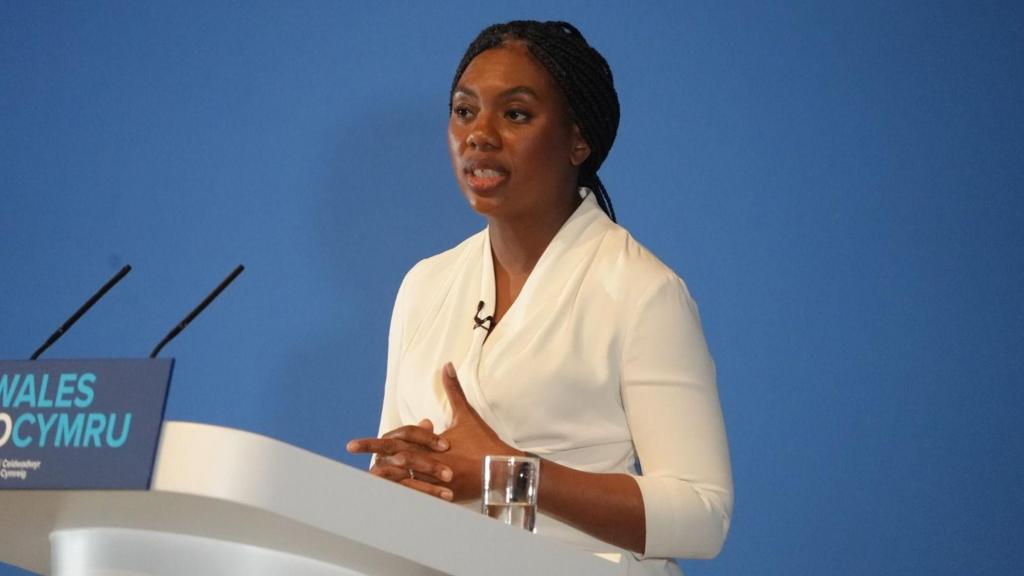UK Conservative leader Kemi Badenoch and Welsh Conservative leader Darren Millar have left the door open to potential post-election coalitions with Plaid Cymru and Reform UK following next year’s Welsh elections.
Current projections suggest a likely need for inter-party cooperation to form the next Welsh government, given the difficulty of securing a majority.
At the opening of the Welsh Conservatives’ conference in Llangollen, Millar stated his party’s willingness to collaborate with “anyone” to oust the Labour government.
Badenoch, while having previously ruled out working with Reform UK at the UK level, acknowledged the possibility of post-election negotiations, but dismissed such discussions as a “distraction.”
Recent polls place the Conservatives in fourth place behind Labour, Reform UK, and Plaid Cymru, a position reflecting their loss of all Welsh MPs in the last general election.
Millar described his party, currently holding 16 seats in the Senedd, as a “government in waiting,” while Badenoch urged members to actively challenge Plaid Cymru and Reform UK.
A Labour coalition with the Conservatives or Reform UK is highly unlikely. Plaid Cymru has ruled out a coalition with Reform UK but remains open to discussions with Labour and the Conservatives.
Deals with either Plaid Cymru or Reform UK are likely to spark internal controversy within the Conservatives, particularly considering Plaid Cymru’s advocacy for Welsh independence.
Speaking on BBC Radio Wales Breakfast, Millar affirmed: “I’m prepared to work with anybody to get rid of this failing Labour government.”
When pressed on collaboration with Reform UK, he reiterated: “I will work with anybody to get rid of this dreadful Welsh Labour government. I’ll say no more than that.”
He offered the same response regarding potential cooperation with Plaid Cymru.
In a BBC Wales interview, Badenoch was questioned about her preference for contesting or collaborating with Plaid Cymru and Reform UK.
She responded: “We’re not here to talk about deals, we’re here to talk about what we are going to do to fix Wales.
“Whenever politicians start talking about who they are going to do deals with or how they are going to get back into government, you can see they are not really thinking about what is going to deliver for the people of this country.
“And that’s why Darren and I are 100% focused on Conservatives winning as many seats as possible.”
While acknowledging the potential reality of post-election discussions with Reform UK or Plaid Cymru, Badenoch stressed that it was not the current focus.
She added: “I’m very clear I’m not having this conversation because it’s a distraction.”
Nigel Farage has indicated Reform UK’s openness to collaboration with any party to form a Welsh government.
In her conference speech, Badenoch criticized Plaid Cymru and Reform UK for engaging in “identity politics.”
She argued that Labour had historically relied on scapegoating in Wales, and that Plaid Cymru and Reform UK were currently benefiting from Labour’s Westminster dominance.
“It’s the politics of identity they are playing and we need to fight back. Reform is not the answer, Labour is not the answer.
“All these other parties are a flavour of the same thing. They tell people what they think they want to hear because they’re trying to help themselves.”
Badenoch described last year’s election results as “devastating” and noted that recent English local elections indicated the party still faced significant challenges.
She declared Wales as “where our fightback begins”.
In her speech, she mistakenly referred to Welsh politicians as “MSPs” before correcting herself, attributing it to a “slip of the tongue”.
Millar earlier acknowledged the “very bruising” impact of last year’s general election defeat, emphasizing the need to rebuild public trust.
He positioned his party as “the only credible alternative to this clapped out, lacklustre Labour government that has run this country into the ground, has run out of ideas and has run out of steam”.
He stated that poor poll results do not discourage him, but rather “motivate[s] me. It makes me work harder”.
He highlighted the Tories’ stance as “pro-freedom, pro-choice, pro-personal responsibility”.
On Friday, the party unveiled several policy proposals, including a commitment to reduce NHS treatment waiting times to one year and the reintroduction of home economics in schools.
Millar described these policies as evidence of the Tories’ readiness for government.
The conference follows internal party disagreements regarding candidate selection, with concerns raised about the potential exclusion of devolution skeptics.
By Gareth Lewis, BBC Wales political editor
Kemi Badenoch’s avoidance of detailed discussion on post-election deals, without explicitly ruling them out, reflects a pragmatic acknowledgment of the party’s weak poll standing and its need for potential alliances to influence Welsh government.
Both Badenoch and Millar seem to recognize that under current circumstances, coalition agreements represent the Conservatives’ best chance for participation in Cardiff Bay’s government.
However, Badenoch’s reluctance suggests awareness of the potential political fallout within the party; a deal with Reform UK poses an existential threat, and an alliance with Plaid Cymru would be internally controversial.
Her language is also noteworthy. While Senedd politicians commonly accept coalition agreements, Westminster politicians tend to view them with more skepticism.
This difference in perception highlights a key distinction in political culture between the two governing levels.
The Conservatives have pledged to reduce NHS waiting times to a maximum of one year if elected next May.
Darren Millar acknowledges public dissatisfaction with devolution.
Mark Drakeford highlights a new law strengthening the Welsh language in education.
The Reform UK leader states a lack of long-term plans to lead the party in Wales.
Kemi Badenoch refrains from endorsing the Prime Minister’s concerns about the UK becoming an “island of strangers”.

